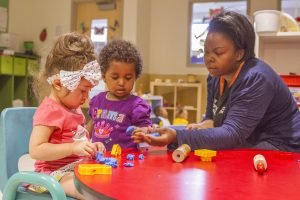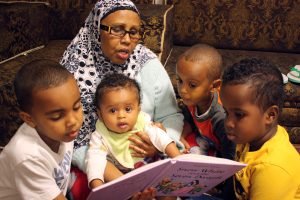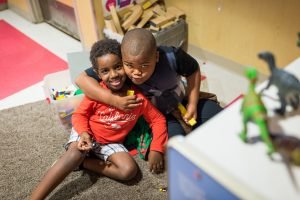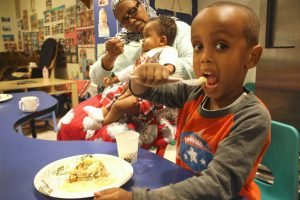A Toddler's Sensory Adventure
Did you know that toddlers learn through sensorimotor experiences? They use their senses to explore the world around them and can process information/concepts by touching, tasting, smelling, seeing, moving and hearing. A day in the life of a toddler is a sensory adventure! Early Childhood Education Teachers are experts in providing opportunities for children to actively use their senses as they explore their world through sensory play. Sensory play is crucial to a toddler’s brain development because it helps to build nerve connections in the brain’s pathways.Here are some examples of sensory experiences in the toddler class at YWCA Minneapolis Children's Center at Abbott Northwestern Hospital.
Sight
 Teachers get down on the child’s level to better understand what the environment looks like from their point of view. When you look around the toddler room, you see a colorful display of artwork, pictures and labels that provide a wide variety of visual information to the children. Toddlers need to see how their hard work can contribute to how their environment looks. For example, a multi-sensory playdough or coloring activity that the class created together can become a beautiful display in the classroom. Additionally, putting away the art supplies and playdough helps make the classroom look organized and safe! Activities like these can be used both at school and at home.
Teachers get down on the child’s level to better understand what the environment looks like from their point of view. When you look around the toddler room, you see a colorful display of artwork, pictures and labels that provide a wide variety of visual information to the children. Toddlers need to see how their hard work can contribute to how their environment looks. For example, a multi-sensory playdough or coloring activity that the class created together can become a beautiful display in the classroom. Additionally, putting away the art supplies and playdough helps make the classroom look organized and safe! Activities like these can be used both at school and at home.
Sound
 Toddler teachers are extraordinary storytellers! To catch and maintain a toddler's attention, a teacher does not simply read a book; they concentrate on their intonation and vary voices for different characters. Sometimes books are even sung!Speaking of singing, music is an important type of communication in lots of situations! It’s a valuable tool for language acquisition, an aid in transitions and a soothing way to help with big emotions. One of our favorite songs here at Abbott is “We Are the Dinosaurs,” and of course, we also have plenty of instruments for toddlers to play while they sing along!
Toddler teachers are extraordinary storytellers! To catch and maintain a toddler's attention, a teacher does not simply read a book; they concentrate on their intonation and vary voices for different characters. Sometimes books are even sung!Speaking of singing, music is an important type of communication in lots of situations! It’s a valuable tool for language acquisition, an aid in transitions and a soothing way to help with big emotions. One of our favorite songs here at Abbott is “We Are the Dinosaurs,” and of course, we also have plenty of instruments for toddlers to play while they sing along!
Taste & Smell
Mealtimes can be a multisensory experience! To encourage exploration with flavors and textures, we try offering children a variety of cold and warm or harder and softer foods and talk about the differences they are experiencing and explain why these different sensory experiences are exciting. For example, “I love to eat my warm soup/oatmeal when it’s cold outside. It helps me to feel so cozy!” It’s easy to incorporate conversations like this into regular meals, especially because we serve such tasty meals here at Abbott, cooked in-house every day!
Touch
 Toddlers learn so much about their environment from their sense of touch. Offering different surfaces to play on such as soft blankets, bumpy mats and smooth tile can create a rich environment for toddlers to experiment with. In our toddler classroom, we have a variety of sensory materials. The most popular is the sensory table, which provides opportunities for touch experiences that correspond with our monthly theme. For example, we may add crunchy leaves during a fall theme or felt and faux fur during our animals theme.Another key factor for the sense of touch is affection from teachers and friends. This can look like a welcoming hug at the beginning of the day or comforting pats on the back during nap time. Physical touch like this can foster a connected classroom family that feels safe and loving for all.
Toddlers learn so much about their environment from their sense of touch. Offering different surfaces to play on such as soft blankets, bumpy mats and smooth tile can create a rich environment for toddlers to experiment with. In our toddler classroom, we have a variety of sensory materials. The most popular is the sensory table, which provides opportunities for touch experiences that correspond with our monthly theme. For example, we may add crunchy leaves during a fall theme or felt and faux fur during our animals theme.Another key factor for the sense of touch is affection from teachers and friends. This can look like a welcoming hug at the beginning of the day or comforting pats on the back during nap time. Physical touch like this can foster a connected classroom family that feels safe and loving for all.
Sensory experiences are important!
There are endless possibilities when it comes to a toddler’s sensory adventure. Sensory experiences are a foundational way that children take in information, respond to their environment, seek nourishment and comfort, and bond with their teacher. Rich experiences like these are the foundation for logical thinking, which leads to a boost in brain development and lays the foundations for later academic success. It is sensory experiences that lead to a child’s ability to complete more complex learning tasks and supports cognitive growth, language development, gross motor skills, social interaction and problem-solving skills.LEARN MORE ABOUT YWCA EARLY CHILDHOOD EDUCATIONSCHEDULE A TOUR

